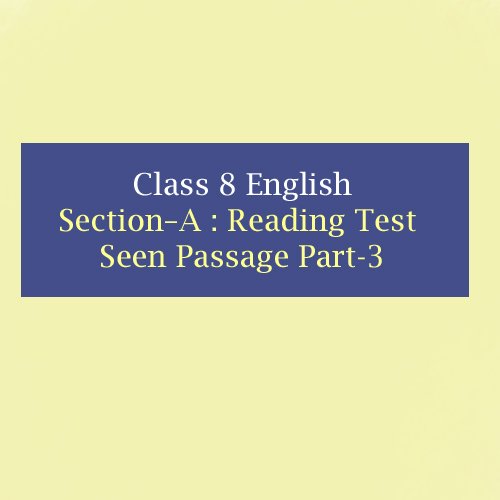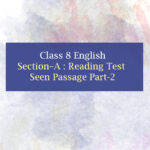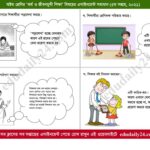Class 8 English Seen Passages Part 6-7

6
Read the text and answer the questions 1, 2 and 3. (Unit–3, Lesson–03)
The word ‘hygiene’ means the practice of keeping ourselves clean. It also means to keep our home and work places clean. It is important for our good health. Hygiene is thought to be next to godliness. It is because we cannot achieve anything physically, mentally or spiritually if we are unclean in our body, mind and soul. Nobody likes an unclean person either. So we must follow the rules of hygiene.
First, we must keep our body clean. We should have a bath every day and wash our hair regularly. This will keep the body and hair free from dirt and bacteria.
Secondly, we should always wash our clothes regularly. Dirty clothes give off bad smell and invite germs. We should wear socks and shoes when we go out to protect our feet from dust and germs. It is also important to wash our hands before meals and after using the toilet.
We should rush our teeth twice a day, after breakfast and supper. We must also cut our nails regularly. Our drinking water must be pure. We can get pure water by boiling and filtering.
Finally, we should keep our surroundings and environment clean.
If we do and follow all the above things properly, we will be able to lead a healthy and happy life.
Set 1
- Choose the best answer from the alternative :
- a) Hygiene is ¾¾ for our good health.
- i) good ii) essential iii) injurious iv) harmful
- b) Hygiene is thought to be next to–
- i) godliness ii) creativeness iii) holiness iv) atheism
- c) Everybody ¾¾ an unclean person.
- i) wants ii) adores iii) likes iv) dislikes
- d) Putting on shoes ¾¾
- i) invites ii) prevents iii) creates iv) removes
- e) We should brush our teeth ¾¾ a day.
- i) four times ii) thrice iii) once iv) twice
- Give short answers to the following questions :
- a) What does hygiene mean?
- b) How can we keep ourselves clean and bacteria free?
- c) What kind of water should we drink?
- d) What should we do before meals and after using toilet?
- e) Why should we keep our environment clean?
- Summarize the above text in around 85 words.
Answer
- (a) (iii) essential; (b) (i) godliness; (c) (iv) dislikes; (d) (ii) prevents; (e) (iv) twice.
- (a) Hygiene means the practice of keeping our body, home and work place clean.
(b) We can keep ourselves clean and bacteria free by taking bath everyday and washing our hair regularly.
(c) We should drink pure water.
(d) We should wash our hand before meals and after using toilet.
(e) We should keep our environment clean to lead a healthy life.
- Hygiene means the practice of keeping our body, home and work place clean. It is very important for us. We should have a bath everyday, brush twice daily, wash clothes and cut nails regularly. By following these, we can lead a healthy and happy life.
Class 8 English Seen Passages Part 6-7
Set 2
- Choose the best answer from the alternatives :
- a) ‘Spiritually’ means ¾¾.
- i) wholly ii) purely iii) divinely iv) nicely
- b) ‘Wear’ means ¾¾.
- i) put off ii) put by iii) put on iv) put in
- c) Which of the following is the example of hygiene?
- i) to take bath in a dirty pond ii) to keep hair uncombed
iii) to wear shoes iv) to keep our room dirty
- d) Which of the following is pure drinking water?
- i) drain water ii) boiled water iii) pond water iv) river water
- e) The word ‘dirt’ refers to ¾¾.
- i) filth ii) fire iii) fume iv) smoke
- Give short answers to the following questions :
- a) What do you understand by the word ‘hygiene’?
- b) When is it important to wash our hands?
- c) How can we observe the rules of health?
- d) Why should we keep our environment clean?
- e) How can we get pure drinking water?
- Summarize the above text in around 85 words.
Class 8 English Seen Passages Part 6-7
Answer
- (a) (iii) divinely; (b) (iii) put on; (c) (iii) to wear shoes; (d) (ii) boiled water; (e) (i) filth.
- (a) The word ‘hygiene’ means the practice of keeping our body, home and work place clean.
(b) It is important to wash our hands before meals and after using toilet.
(c) We can observe the rules of health by bathing everyday, by washing clothes regularly and keeping our surroundings and environment clean.
(d) We should keep our environment clean to lead a healthy and happy life.
(e) We can get pure drinking water by boiling and filtering it.
- Same as Set 1
Set 3
- Choose the best answer from the alternatives :
- a) The word ‘hygiene’ is related with ¾¾.
- i) happiness ii) unhappiness iii) cleanliness iv) truthfulness
- b) ‘Clean’ refers to ¾¾.
- i) dirty ii) dirt-free iii) foregone iv) desire
- c) Hygiene is important for ¾¾.
- i) earning money ii) getting job iii) doing work iv) preserving good health
- d) What does the word ‘important’ mean?
- i) Developed ii) Drevious iii) Significant iv) Authorised
- e) Who is not liked by anyone?
- i) A healthy person ii) A rich man iii) An unclean person iv) An unhealthy person
- Answer the following questions :
- a) What can be a hotbed of germs?
- b) How many times should we brush our teeth a day?
- c) What kind of water should we drink?
- d) What does hygiene mean?
- e) How can we get pure water?
- Summarize the above text in around 85 words.
Answer
- (a) (iii) clealniness; (b) (ii) dirt-free; (c) (iv) preserving good health; (d) (iii) Significant; (e) (iii) An unclean person.
- (a) Our surroundings and environment can be a hotbed of germs.
(b) We should brush our teeth twice a day.
(c) We should drink pure water.
(d) Hygiene means cleanliness.
(e) We can get pure water by boiling and filtering.
- Same as Set 1
Set 4
- Choose the best answer from the alternatives :
(a) Hygiene is ¾¾ for our good health.
- bad ii. essential iii. god iv. harmful
(b) Everybody ¾¾ an unclean person.
- hates ii. likes iii. dislikes iv. adorn
(c) We must ¾¾ by the rules of hygiene.
- disobey ii. follow iii. live iv. abide
(d) Our environment should be ¾¾ clean.
- kept ii. keep iii. keeping iv. to keep
(e) We ¾¾ to keep our body clean.
- bath ii. bathe iii. sleep iv. take exercise
- Write short answer to the following questions.
(a) What does the word hygiene mean?
(b) What is thought to be godliness?
(c) Why is hygiene important?
(d) Why should we wash our clothes regularly?
(e) How will we be able to lead a healthy and happy life?
- Summarize the above text in around 85 words.
Answer
- (a) (ii) essential; (b) (iii) dislikes; (c) (iv) abide; (d) (i) kept; (e) (ii) bathe.
- (a) The word hygiene means the practice of keeping ourselves, our home and workplaces clean.
(b) To maintain the rules of hygiene is thought to be godliness.
(c) Hygiene is important because we cannot achieve anything physically, mentally or spiritually if we don’t follow the rules of hygiene.
(d) We should wash our clothes regularly because dirty clothes give off bad smell and invite germs.
(e) We will be able to lead a healthy and happy life by following the rules of hygiene.
- Same as Set 1
Set 5
- Choose the best answer from the alternatives.
(a) ‘Hygiene’ means¾¾.
- practice of keeping aloof from cleanliness ii. practice of keeping ourselves clean
iii. practice of eating healthy food iv. practice of keeping untidy
(b) Hygiene is ¾¾ to our health.
- detrimental ii. injurious iii. inimical iv. advantageous
(c) Hygiene is thought to be next to ¾¾.
- godliness ii. creativeness iii. holiness iv. atheism
(d) We can’t achieve anything physically, mentally or spiritually ¾¾ we are clean.
- if ii. however iii. whether iv. unless
(e) Our drinking water must be ¾¾.
- refresh ii. polluted iii. untreated iv. uncontaminated
- Answer to the following questions.
(a) Why is hygiene important?
(b) What happens to an unclean person?
(c) How can we keep our body clean?
(d) When is it important to wash our hands?
(e) Why should we keep our surroundings and environment clean?
- Summarize the above text in around 85 words.
Answer
- (i) (b) practice of keeping ourselves clean; (ii) (d) advantageous; (iii) (a) godliness; (iv) (d) unless;
(v) (d) uncontaminated. - (a) Hygiene is important because it helps us maintain good health.
(b) An unclean person cannot achieve anything physically, mentally or spiritually. Moreover nobody likes an unclean person.
(c) We can keep our body clean by having a bath everyday and washing our hair regularly.
(d) It is important to wash our hands before meals and after using the toilet.
(e) We should keep our surroundings and environment clean to lead a healthy and happy life.
- Same as Set 1
Set 6
- Guess the meaning of the following words and choose the correct meaning closest to the text :
(a) happy
- shocked ii. gloomy iii. cheerful iv. hobby
(b) pure
- costly ii. valuable iii. rare iv. uncontaminated
(c) protect
- ruin ii. devastate iii. preserve iv. destroy
(d) dirt
- cool ii. liquid thing iii. filth iv. solid thing
(e) follow
- observe ii. disturb iii. avoid iv. hurt
- Answer to the following questions :
(a) How many times and when should we brush our teeth daily?
(b) Why is hygiene important?
(c) What happens to an unclean person?
(d) Why should we wash our clothes regularly?
(e) What do the dirty clothes produce?
- Summarize the above text in around 85 words.
Answer
- (a) (iii) cheerful; (b) (iv) uncontaminated; (c) (iii) preserve; (d) (iii) filth; (e) (i) observe.
- (a) We should brush our teeth two times a day, after breakfast and supper.
(b) Hygiene is important for our good health.
(c) An unclean person cannot achieve anything physically, mentally or spiritually. Moreover, nobody likes him.
(d) We should wash our clothes regularly because if we do not do so, they will become dirty.
(e) The dirty clothes produce bad smell and invite germs.
- Same as Set 1
Set 7
- Choose the best answer from the alternatives :
(a) What is important for our good health?
- Comfort ii. Hygiene iii. Friends iv. Unknown
(b) ‘Hygiene’ is thought to be next to ¾¾.
- Holiness ii. Goodness iii. Godliness iv. Cleanliness
(c) When should we brush our teeth?
- Before breakfast ii. Before and after breakfast
iii. After breakfast and supper iv. Every time we wake up
(d) ‘Practice’ refers to ¾¾.
- habit ii. practise iii. divide iv. exercise
(e) ‘Thought’ stands for ¾¾.
- idea ii. guessed iii. regarded iv. estimated
- Give short answers to the following questions.
(a) What does hygiene mean?
(b) Why should we wash our clothes regularly?
(c) Why do we wear socks and shoes?
(d) How many times should we brush our teeth a day?
(e) How can we get pure water?

- Summarize the above text in around 85 words.
Answer
- (i) (b) Hygine; (ii) (c) Godliness; (iii) (c) After breakfast and supper; (iv) (a) habit; (v) (a) idea.
- (a) Hygiene means cleanliness.
(b) We should wash our clothes regularly because dirty clothes give off bad smell and invite germs.
(c) We should wear socks and shoes to protect our feet from dust and germs.
(d) We should brush our teeth twice a day.
(e) We can get pure water by boiling and filtering.
- Same as Set 1
Set 8
- Choose the best answer from the alternatives :
(a) Hygiene is a ¾¾ for good health.
- necessary ii. important iii. must iv. essential
(b) Unclean clothes ¾¾ bad.
- look ii. smell iii. are iv. give off
(c) Putting on shoes ¾¾ germs.
- prevents ii. invites iii. creates iv. remove
(d) The word ‘hygiene’ refers to ¾¾.
- untidy ii. cleanliness iii. smartness iv. freshness
(e) Filtered water is ¾¾.
- unsafe ii. impure iii. safe iv. transparent
- answer to the following questions.
(a) What is hygiene?
(b) Why is hygiene necessary?
(c) Why should we bathe regularly?
(d) How can we purify drinking water?
(e) When should we brush our teeth?
- Summarize the above text in around 85 words.
Answer
- (a) (iii) must; (b) (ii) smell; (c) (i) prevents; (d) (ii) cleanliness; (e) (iii) safe.
- (a) Hygiene means cleanliness.
(b) Hygiene is necessary for our good health.
(c) We should bathe regularly to keep our body and hair free from dirt and bacteria.
(d) We can purify drinking water by boiling and filtering.
(e) We should brush our teeth two times a day after breakfast and supper.
- Same as Set 1
Set 9
- Choose the best answer from the alternatives :
(a) Hygiene is after ¾¾.
- sacredness ii. secrecy iii. sanctuary iv. purity
(b) The term ‘pure’ means ¾¾.
- neat ii. sheer iii. unadulterated iv. all
(c) Cleanliness is ¾¾ for good health.
- exuberant ii. useless iii. indispensable iv. unnecessary
(d) Dirty clothes ¾¾ bad smell.
- absorb ii. remove iii. spread iv. attract
(e) An unclean person cannot ¾¾ anything spiritually.
- procure ii. learn iii. contribute iv. give
- Give short answer to the following questions.
(a) How can we lead a happy and healthy life?
(b) How is an unclean person treated?
(c) What does hygiene mean?
(d) What does a regular shower do?
(e) How can we get pure water?
- Summarize the above text in around 85 words.
Answer
- (a) (i) sacredness; (b) (iv) all; (c) (iii) indispensable; (d) (iii) spread; (e) (i) procure.
- (a) We can lead a happy and healthy life by following the rules of hygiene.
(b) An unclean person is disliked by us.
(c) Hygiene means cleanliness.
(d) A regular shower keeps run body and hair free from dirt and becteria.
(e) We can get pure water by boiling and filtering.
- Same as Set 1
Set 10
- Choose the best answer from the alternatives.
(a) ‘achieve means ¾.
- lose ii. forfeit iii. loose iv. attain
(b) ‘hygiene’ refers to ¾.
- untidy ii. freshness iii. cleanliness iv. smartness
(c) ‘follow’ means ¾.
- avoid ii. disobey iii. ignore iv. observe
(d) ‘protect’ means ¾.
- ruin ii. devastate iii. preserve iv. put off
(e) ‘lead’ means ¾.
- run ii. conduct iii. sustain iv. maintain
- Answer the following questions in your own words.
(a) How many times should we brush our teeth a day?
(b) Why should we wash our clothes regularly?
(c) What is thought to be godliness?
(d) What happens to an unclean person?
(e) How can we protect our feet from dust and germs?
- Summarize the above text in around 85 words.
Answer
- (a) (iv) attain; (b) (iii) cleanliness; (c) (iv) observe; (d) (iii) preserve; (e) (iv) maintain.
- (a) We should brush our teeth twice a day.
(b) We should wash our clothes regularly because dirty clothes give off bad smell and invite germs.
(c) Hygiene is thought to be godliness.
(d) An unclean person is not able to lead a healthy and happy life.
(e) We can protect our feet from dust and germs by wearing socks and shoes.
- Same as Set 1
Class 8 English Seen Passages Part 6-7
Set 11
- Choose the best answer from the alternatives.
(a) The term ‘hygiene’ refers to ¾.
- inaction ii. godliness iii. cleanliness iv. practice
(b) Cleanliness has positive impact on our ¾.
- body ii. mind iii. soul iv. body and mind
(c) ‘Hygiene’ is important for ¾.
- earning money ii. getting job iii. preserving good health iv. doing work
(d) What does the word “important” mean?
- developed ii. significant iii. previous iv. authorised
(e) Everybody ¾ a tidy person.
- likes ii. praises iii. dislikes iv. rebukes
- Answer the following questions in your own words.
(a) What does hygiene mean?
(b) Why is it important to follow the rules of cleanliness?
(c) What do the dirty clothes produce?
(d) How many times should we brush our teeth a day?
(e) How can we lead a happy and healthy life?
- Summarize the above text in around 85 words.
Answer
- (a) (iii) cleanliness; (b) (iv) body and mind; (c) (iii) preserving good health; (d) (ii) significant; (e) (i) likes.
- (a) Hygiene means cleanliness.
(b) It is important to follow the rules of cleanliness because it is connected with our good health. Besides, we cannot achieve anything physically, mentally or spiritually without following it.
(c) The dirty clothes produce bad smell.
(d) We should brush our teeth twice a day after breakfast and supper.
(e) By following the rules of hygiene, we can lead a happy and healthy life.
- Same as Set 1
Class 8 English Seen Passages Part 6-7
Set 12
- Choose the best answer from the alternatives.
(a) hygiene
- cleanliness ii. purity iii. sanctity iv. modesty
(b) follow
- reject ii. avoid iii. evade iv. adopt
(c) godliness
- sacredness ii. secrecy iii. sanctuary iv. purity
(d) finally
- properly ii. initially iii. lastly iv. perfectly
(e) give off
- extinguish ii. put out iii. preserve iv. emit
- Answer the following questions in your own words.
(a) What do you understand by the word, ‘hygiene’?
(b) Why should we keep our body clean?
(c) How can we observe the rules of health?
(d) Why should we put on clean clothes?
(e) How can we get pure water?
- Summarize the above text in around 85 words.
Answer
- (a) (i) cleanliness; (b) (iv) adopt; (c) (i) sacredness; (d) (iii) lastly; (e) (iv) emit.
- (a) The word, ‘hygiene’ means cleanliness.
(b) We should keep our body clean to remain healthy.
(c) We have to take a bath everyday and wash our hair regularly. We should wash our clothes daily. We should wear socks and shoes to protect our feet from dust and germs. We should wash our hands before meals and after using the toilet. We should brush our teeth twice a day. Thus we can observe the rules of health.
(d) We should put on clean clothes to protect ourselves from germs.
(e) We can get pure water by boiling and filtering.
- Same as Set 1
Set 13
- Choose the best answer from the alternatives.
(a) We can get pure water by ¾¾.
- boiling ii. filtering iii. boiling and filtering iv. none of the above
(b) Which of the following words have the closest meaning of the word ‘give off?
- Retain ii. Keep iii. Emit iv. Contain
(c) An unclean person cannot ¾¾ anything spiritually.
- wait ii. gain iii. buy iv. take
(d) Which of the following words have the closest meaning of the word ‘Protect’?
- Preserve ii. Ruin iii. Devastate iv. Destroy
(e) The first step of cleanliness in to keep our ¾¾.
- body clean ii. body unclean iii. mental peace iv. mental purity
- Give short answer to the following questions.
(a) What can be a hotbed of germs?
(b) What should we do before going out?
(c) How can we lead a happy and healthy life?
(d) Why will we abide by the rules of hygiene?
(e) Whom does nobody like?
- Summarize the above text in around 85 words.
Answer
- (a) (iii) boiling and filtering; (b) (iii) Emit; (c) (ii) gain; (d) (i) Preserve; (e) (i) body clean.
- (a) Dirty clothes can be a hotbed of germs.
(b) We should wear socks and shoes before going out.
(c) We can lead a happy and healthy life by following the rules of hygiene and keeping our surroundings and environment clean.
(d) We will abide by the rules of hygiene to lead a healthy and happy life.
(e) Nobody likes an unclean person.
- Same as Set 1
Class 8 English Seen Passages Part 6-7
Set 14
- Guess the meaning of the following words and choose the correct meaning closet to the text.
(a) hygiene
- cleanliness ii. vigour iii. cover iv. deter
(b) achieve
- share ii. attain iii. time iv. illusive
(c) spiritually
- corrupt ii. sharpen iii. morally iv. illusive
(d) pure
- pleader ii. scorn iii. real iv. affluent
(e) filtering
- slight ii. weak iii. depute iv. separating out
- Answer the following questions.
(a) How can we get clean water?
(b) Why should we keep ourselves clean?
(c) Why should we avoid dirty clothes?
(d) How can we get things by cleanliness?
(e) What can be a hotbed of germs?
- Summarize the above text in around 85 words.
Answer
- (a) (i) cleanliness; (b) (ii) attain; (c) (iii) morally; (d) (iii) real; (e) (iv) separating out.
- (a) We can get clean water by boiling and filtering.
(b) We should keep ourselves clean to be free from dirt and bacteria.
(c) We should avoid dirty clothes because dirty clothes give off bad smell and invite germs.
(d) We can achieve anything physically, mentally or spiritually in our body, mind and soul by cleanliness.
(e) Dirty clothes can be a hotbed of germs.
- Same as Set 1
Class 8 English Seen Passages Part 6-7
7
Read the text and answer the questions 1, 2 and 3. (Unit–5, Lesson–01)
There is a small village called Bhabanipur in Jhenaidah. It is a typical Bangladeshi village. People here spend their day-to-day life mostly working in the fields and doing household work. In this ordinary village, there lives an extraordinary woman named Shamima Akhter Maya. Shamima’s willpower and determination have made her extraordinary. She has seen the most cruel aspect of life. But the cruelty could not defeat her spirit. She has come out as a winner, defying all the odds of life. Shamima is now 32 years old. She has only one son named Ashikur Rahman Kanok. She runs a small boutique called ‘Oikko Nari Kollayan Shangstha’ in her village. Let’s hear from Shamima, how she succeeded in setting up her boutique.
Set 1
- Guess the meaning of the following words choose the correct meaning closest to the text.
(a) typical
- unusual ii. usual iii. famous iv. infamous
(b) aspect
- appearance ii. position iii. characteristics iv. piece
(c) odd
- old ii. queer iii. add iv. double
(d) cruel
- gentle ii. generous iii. simple iv. unkind
(e) spirit
- ghost ii. soul iii. strength iv. wisdom
- Answer the following questions.
(a) Who is Shamima? What made her extraordinary?
(b) Where is Bhabanipur situated? What type of village is it?
(c) What is Oikko Nari Kollayan Shangstha? Who runs it?
(d) What do the people of Bhabanipur usually do?
(e) How does she come out as a winner?
- Summarize the above text in around 85 words.
Answer
- (a) (ii) usual; (b) (iii) characteristics; (c) (ii) queer; (d) (iv) unkind; (e) (iii) strength.
- (a) Shamima is an extraordinary woman. Her willpower and determination have made her extraordinary.
(b) Bhabanipur is situated in Jhenaidah. It is a typical Bangladeshi village.
(c) ‘Oikko Nari Kollyan Shangstha’ is a small boutique and Shamima runs it.
(d) The people of Bhabanipur usually do their day-to-day works in the fields and do small jobs.
(e) She comes out as a winner defying all the odds of life by her willpower and determination.
- Shamima Akhter, an extraordinary woman lives in a typical Bangladeshi village called Bhabanipur in Jenaidah. She had to undergo a lot of suffering in her life. However, she overcame all the obstacles by her extraordinary willpower and determination. She has come out victorious. Now she runs a boutique successfully.
Set 2
- Guess the meaning of the following words and choose the correct meaning closest to the text :
(a) defy
- to beat ii. to repeat iii. to refuse iv. to confuse
(b) cruelty
- human ii. benevolent iii. barbarity iv. bereft
(c) typical
- general ii. common iii. distinguish iv. distractive
(d) aspect
- direction ii. related iii. special side iv. besides
(e) spend
- waste ii. utilize iii. pass by iv. pass over
- Answer the following questions.
(a) In what sense is the village, Bhabanipur a typical village?
(b) What might be the cruel aspect of Shamima’s life?
(c) How has Shamima become victorious?
(d) What did help Shamima to defeat all the odds?
(e) Is Shamima a model for the poverty-stricken women? How? Explain it.
- Summarize the above text in around 85 words.
Answer
- (a) (iii) to refuse; (b) (iii) barbarity; (c) (ii) common; (d) (iii) special side; (e) (ii) utilize.
- (a) Bhabanipur is a typical village in the sense that people there spend their time working in the fields and doing small jobs.
(b) Deprivation and all the odds of life might be the cruel aspect of shamima’s life.
(c) Shamima has become victorious defying all the odds of life.
(d) Shamima’s willpower and determination helped her defeat all the odds.
(e) Yes, Shamima is a model for the poverty-stricken women. Because she has defeated all her miseries through strong will power. She has become self-reliant.
- Same as Set 1
Set 3
- Choose the best answer from the alternatives.
(a) The word ‘typical’ means ¾¾.
- usual ii. unusual iii. famous iv. special
(b) She has seen the most cruel aspect of life. Here Ôcruel‘ is a/an ¾¾.
- noun ii. verb iii. adjective iv. pronoun
(c) The ¾¾ of Shamima makes her successful.
- weakness ii. willpower iii. wish iv. desire
(d) Now Shamima is ¾¾.
- child ii. middle-aged iii. teenager iv. old
(e) Shamima is a/an ¾¾ person.
- common ii. simple iii. normal iv. amazing
- Answer the following questions.
(a) What type of village does Shamima live in?
(b) What do the people in Bhabanipur usually do?
(c) What does Shamima run?
(d) What is Oikko Nari Kollayan Shangstha?
(e) What made Shamima extraordinary?
- Summarize the above text in around 85 words.
Answer
- (a) (i) usual; (b) (iii) adjective; (c) (ii) willpower; (d) (ii) middle-aged; (e) (iv) amazing.
- (a) Shamima lives in a typical village of Bangladesh.
(b) The people in Bhabanipur spend their day-to-day life mostly working in the fields and doing small jobs.
(c) Shamima runs a small boutique called ‘Oikko Nari Kollayan Shangstha’ in her village.
(d) ‘Oikko Nari kollayan Shangstha’ is a small boutique.
(e) Shamima’s willpower and determination made her extraordinary.
- Same as Set 1
Set 4
- Write the correct meaning of the following words.
(a) ordinary
- unordinary ii. extraordinary iii. simple iv. rare
(b) willpower
- diligence ii. labourious iii. firmness iv. painstaking
(c) determination
- sluggish ii. resoluteness iii. stubborn iv. obstinate
(d) aspect
- subject ii. theme iii. object iv. direction
(e) defy
- disobey ii. observe iii. abide iv. follow
- Answers the following questions.
(a) In which district is the village Bhabanipur situated?
(b) What type of woman is Shamima?
(c) How old is Shamima now?
(d) What does Shamima run?
(e) What made Shamima extraordinary?
- Summarize the above text in around 85 words.
Answer
- (i) (c) simple; (ii) (c) firmness; (iii) (b) resoluteness; (iv) (b) theme; (v) (a) disobey.
- (a) The village of Bhabanipur is situated in the district of Jhenaidah.
(b) Shamima is an extraordinary woman.
(c) Shamima is now 32 years old.
(d) Shamima runs a small boutique called Oikko Nari kollayan Shangstha.
(e) Shamima’s willpower and determination made her extraordinary.
- Same as Set 1
Set 5
- Guess the meaning of the following words.
(a) typical
- unusual ii. uncommon iii. abnormal iv. representative
(b) mostly
- particularly ii. certainly iii. mainly iv. hardly
(c) job
- a piece of work ii. unemployment iii. duty iv. responsibility
(d) ordinary
- common ii. different iii. the same iv. unusual
(e) extraordinary
- common ii. simple iii. charming iv. incredible
- Answer the following questions.
(a) What could not defeat Shamima’s spirit?
(b) How does Shamima make her extraordinary?
(c) What does she run?
(d) What type of village does Shamima live in?
(e) Why couldn’t the cruelty defeat her?
- Summarize the above text in around 85 words.
Answer
- (a) (iv) representative; (b) (iii) mainly; (c) (i) a piece of work; (d) (i) common; (e) (iv) incredible.
- (a) The cruelty of life could not defeat Shamima’s spirit.
(b) Shamima makes herself extraordinary by her willpower and determinaton. With these qualities, she has defted all the odds of life and come out as a winner.
(c) She runs a small boutique called ‘Oikko Nari Kollayan Shangstha in her village.
(d) Shamima lives in a typical Bangladeshi village.
(e) The cruelty could not defeat her because she had great willpower and determination.
- Same as Set 1
Set 6
- Choose the best answer from the alternatives :
(a) Shamima’s story ¾¾ everyone.
- fascinated ii. astonished iii. shocked iv. worried
(b) Shamima did not want to get married because she wanted to complete her education but nobody ¾¾ her.
- talked to ii. listened to iii. took care of iv. looked after
(c) What does it mean by ‘adolescent’.
- a youngman ii. a young person aged between 13 and 18
iii. a boy iv. a girl
(d) “Bring about” means.
- cause to happen ii. fetch iii. get iv. procure
(e) Shamima had to face many ¾¾ of life.
- features ii. odds iii. aspects iv. worries
- Give short answer to the following questions.
(a) What do the people of “Bhabanipur” village usually do?
(b) Why was Shamima extraordinary?
(c) What did Shamima dream of?
(d) Why couldn’t the cruelty defeat her?
(e) How did Shamima want to fulfill her dream?
- Summarized the passage in around 85 words.
Answer
- (a) (ii) astonished; (b) (ii) listened to; (c) (ii) a young person aged between 13 and 18; (d) (i) cause to happen; (e) (ii) odds.
- (a) The people of Bhabanipur village usually stand their day-to-day life mainly in the field and do small jobs.
(b) Shamima was extraordinary because she with her willpower and determination overcame the most cruel aspects of life.
(c) Shamima dreamt of completing her education and getting a good job to bring about a change in her life.
(d) The cruelty could not defeat her because she had strong willpower and determination.
(e) Shamima wanted to fulfil her dream by completing her education.
- Same as Set 1














